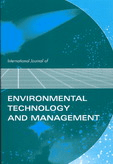
International Journal of Environmental Technology and Management
Scope & Guideline
Connecting research and practice in environmental technology.
Introduction
Aims and Scopes
- Environmental Pollution Assessment:
Research on assessing various types of environmental pollution, including air, water, and soil, utilizing advanced analytical methods and technologies. - Sustainable Resource Management:
Studies that focus on the sustainable management of natural resources, including energy, water, and materials, aimed at reducing environmental impact. - Urban and Regional Planning:
Research that explores planning methods and strategies for urban and rural landscapes to promote ecological sustainability and resilience. - Innovative Remediation Technologies:
Development and evaluation of innovative technologies for the remediation of contaminated sites and the treatment of waste. - Remote Sensing and Data Analysis:
Utilization of remote sensing techniques and data analytics for environmental monitoring, land use planning, and ecological assessments. - Ecotourism and Environmental Impact:
Assessment of environmental carrying capacity and impacts of ecotourism on local ecosystems and communities. - Climate Change Adaptation and Mitigation:
Research focused on strategies for adapting to and mitigating the effects of climate change across various sectors.
Trending and Emerging
- Smart Environmental Monitoring:
There is a notable increase in research utilizing IoT and 5G technologies for real-time environmental monitoring and data collection. - Green Infrastructure and Urban Resilience:
Emerging studies focus on the integration of green infrastructure in urban planning to enhance resilience against climate change and improve ecological health. - Advanced Remediation Techniques:
Research on advanced remediation technologies, such as bioremediation and nanotechnology for pollution treatment, is gaining momentum. - Circular Economy Practices:
The journal is increasingly publishing studies on circular economy principles, emphasizing sustainable production and consumption patterns. - Machine Learning in Environmental Analysis:
The application of machine learning techniques for environmental data analysis and predictive modeling is becoming more prevalent. - Ecosystem Services Valuation:
There is a rising interest in assessing and valuing ecosystem services in the context of urban and rural planning.
Declining or Waning
- Traditional Waste Management:
Research papers focusing on conventional waste management practices are becoming less frequent, as the field shifts towards innovative, sustainable waste-to-energy and recycling technologies. - Basic Environmental Education:
There is a decline in publications that focus solely on basic environmental education and awareness, as the journal emphasizes more technical and applied research. - Generalized Climate Studies:
Studies that provide a broad overview of climate change impacts without specific regional focus or innovative solutions are becoming less prominent, with more emphasis on localized, actionable research. - Single-Discipline Approaches:
Research that does not integrate interdisciplinary methods or perspectives is waning, as the journal increasingly values studies that combine multiple fields of expertise.
Similar Journals

Water Conservation Science and Engineering
Empowering Global Efforts in Water ConservationWater Conservation Science and Engineering, published by SPRINGERNATURE, is a vital academic journal dedicated to advancing the fields of environmental engineering, ocean engineering, waste management, and water science and technology. Since its inception in 2016, the journal has quickly established itself within the academic community, achieving a commendable Q3 ranking across multiple categories in 2023. With an ISSN of 2366-3340 and an E-ISSN of 2364-5687, it is accessible to a global readership eager to explore the latest research and innovations in water conservation and sustainable practices. Although currently not open access, the journal is committed to publishing high-quality scholarly articles that provide insights into effective water management strategies, innovative engineering solutions, and the critical importance of preserving our water resources. Based in Singapore, Water Conservation Science and Engineering aims to foster interdisciplinary collaboration among researchers, professionals, and students, making it an essential resource for anyone passionate about environmental sustainability and preservation.
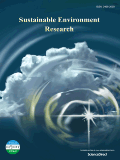
Sustainable Environment Research
Pioneering solutions for a cleaner, greener planet.Sustainable Environment Research, an esteemed journal published by BMC, serves as a pivotal platform for disseminating innovative research in the fields of Environmental Engineering, Pollution, and Renewable Energy. Established in 2016 as an Open Access journal, it facilitates the widespread sharing of knowledge and advancements across the globe, reflecting its commitment to enhancing environmental sustainability. With an impressive Q1 ranking in multiple categories, including Water Science and Technology and Pollution, the journal is recognized for its significant impact, currently holding a rank of 31st in Environmental Science - Water Science and Technology. The journal actively invites researchers, professionals, and students to contribute to crucial discussions around sustainable practices and technologies, thus addressing worldwide environmental challenges. Based in Taiwan but accessible internationally, Sustainable Environment Research provides a valuable resource for those dedicated to advancing the science of sustainability.
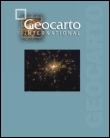
Geocarto International
Bridging Disciplines for a Sustainable FutureGeocarto International is a premier peer-reviewed journal published by Taylor & Francis Ltd that focuses on the intersection of geography, planning, and environmental science, offering valuable insights into emerging research trends and methodologies within these fields. With an impressive impact factor, the journal is consistently recognized for its contributions, ranked in the Q1 category for Geography, Planning, and Development as well as Q2 in Water Science and Technology as of 2023. Geocarto International not only showcases high-quality research articles but also embraces Open Access publishing since 2023, promoting accessibility and fostering a global dialogue among researchers, professionals, and students. Spanning over three decades from its inception in 1986 to 2024, the journal continues to serve as an essential platform for disseminating knowledge, advancing scholarly communication, and addressing crucial environmental challenges across the United Kingdom and beyond. Explore the latest advancements and contribute to the dynamic discussions shaping the future of geography and environmental sciences through Geocarto International.
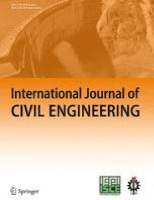
International Journal of Civil Engineering
Elevating Standards in Civil and Structural EngineeringThe International Journal of Civil Engineering, published by Springer International Publishing AG, is a premier platform dedicated to advancing the field of civil engineering. With a notable impact factor and a strong reputation reflected in its Q2 quartile rankings in both Civil and Structural Engineering as well as Geotechnical Engineering and Engineering Geology, this journal facilitates the dissemination of high-quality research from 2009 through 2024. Researchers and professionals can access cutting-edge studies and innovative practices that address contemporary challenges in civil engineering, such as sustainable infrastructure development, environmental impacts, and advanced material technologies. Situated in Switzerland, the International Journal of Civil Engineering emphasizes the critical interplay between theory and application, making it an essential resource for students, academics, and industry leaders seeking to stay at the forefront of their disciplines.

Frontiers of Environmental Science & Engineering
Connecting research and practice to shape environmental progress.Frontiers of Environmental Science & Engineering is a premier journal published by HIGHER EDUCATION PRESS that stands at the forefront of interdisciplinary research in environmental science and engineering. Established in 2013 and converging its scope through 2024, this journal has swiftly ascended to a notable Q1 category in the Environmental Science (Miscellaneous) segment, highlighting its remarkable impact and relevance. With a Scopus ranking of 27 out of 233 in its field, placing it within the top 88th percentile, it serves as a crucial platform for disseminating cutting-edge research, innovative methodologies, and pressing environmental concerns. Researchers, professionals, and students alike will find valuable insights and opportunities for collaboration within its pages. While the journal operates under a subscription model, its commitment to advancing the field makes it an essential resource for those dedicated to addressing the world's environmental challenges, fostering sustainable practices, and pioneering engineering solutions.

Frontiers in Environmental Science
Exploring innovative solutions to environmental challenges.Frontiers in Environmental Science, published by FRONTIERS MEDIA SA, stands as a pivotal platform in the sphere of environmental research, showcasing innovative findings and interdisciplinary studies that address pressing environmental challenges. With an impressive open access policy since its inception in 2013, it enhances accessibility and promotes knowledge dissemination among researchers, practitioners, and students worldwide. The journal, recognized for its contributions with a Q2 ranking in the Environmental Science category and an engaging position within the 65th percentile on Scopus, provides a comprehensive archive of research that is both timely and relevant. Covering diverse topics from climate change to sustainable resource management, it inspires critical dialogue and fosters collaborative efforts to shape a more sustainable future. Based in Lausanne, Switzerland, this journal invites contributions that advance the field and fulfill its objective of bridging science with practical applications, making it an essential resource for anyone committed to the environmental sciences.

EQA-International Journal of Environmental Quality
Unlocking insights for a healthier planet.EQA-International Journal of Environmental Quality, published by the University of Bologna, Department of Agricultural Sciences, is a premier open-access journal dedicated to the multidisciplinary exploration of environmental quality issues. Established in 2009, it aims to foster a greater understanding of the intricate interactions between human activities and environmental health. With a focus on innovative research, the journal contributes to the advancement of knowledge across diverse fields, making it an essential resource for researchers, professionals, and students engaged in environmental science and sustainability. The journal operates with an emphasis on accessibility, ensuring that critical findings reach a global audience without barriers. With an impressive Scopus rank of 88 out of 171, EQA stands as a significant platform for disseminating impactful research that informs policy and promotes environmental stewardship.

Environmental Science and Ecotechnology
Exploring the intersection of science and sustainability.Environmental Science and Ecotechnology is a premier academic journal published by ELSEVIER, dedicated to the advancement of research in the fields of environmental science and ecological technology. With an ISSN of 2666-4984, this journal is recognized for its high-quality content and rigorous peer-review process, contributing significantly to the discourse on sustainable practices and innovative solutions to pressing environmental issues. Since its inception in 2020, Environmental Science and Ecotechnology has quickly established itself within the academic community, achieving a remarkable position in Scopus rankings, including Q1 status in Ecology, Environmental Engineering, and Miscellaneous Environmental Sciences. This journal publishes cutting-edge research that not only addresses theoretical frameworks but also offers practical applications relevant to policy-making and industry. Although it operates under a subscription model, the journal strives to reach a global audience by facilitating wide dissemination of groundbreaking findings. Researchers, practitioners, and students alike will benefit from its comprehensive coverage and insightful contributions that are vital for shaping a sustainable future.
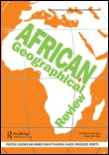
African Geographical Review
Connecting Scholars to Africa's Diverse Geographical NarrativesAfrican Geographical Review is a pivotal academic journal published by Routledge Journals, Taylor & Francis Ltd, whose mission is to advance knowledge and understanding of geographical dynamics across the African continent. With an ISSN of 1937-6812 and an E-ISSN of 2163-2642, this journal consistently delivers high-quality research, showcasing innovative perspectives and interdisciplinary approaches within the fields of Earth-Surface Processes and Geography, Planning and Development. Recognized in 2023 with a Q2 ranking in these categories, it ranks #231 out of 821 in Social Sciences and #63 out of 179 in Earth and Planetary Sciences according to Scopus metrics, reflecting its substantial impact and relevance. Featuring research that spans various geographic themes, the journal not only champions academic inquiry but also fosters a deeper understanding of spatial and environmental challenges unique to Africa. Engaging with a diverse audience of researchers, professionals, and students, the African Geographical Review serves as an indispensable resource for those committed to enhancing geographic scholarship and informing sustainable development practices across the continent.
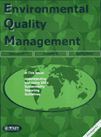
ENVIRONMENTAL QUALITY MANAGEMENT
Innovating Insights for a Healthier PlanetENVIRONMENTAL QUALITY MANAGEMENT is a respected journal published by WILEY, focusing on interdisciplinary studies that merge environmental science with public health, management, policy, and law. Since its inception in 1991, this journal has provided a platform for researchers and practitioners to share innovative insights and advancements in understanding environmental quality and its impacts on human health and the ecosystem. With an ISSN of 1088-1913 and an E-ISSN of 1520-6483, it holds a significant position in the academic community, evidenced by its presence in the Q3 quartile across several categories, including Management, Monitoring, Policy and Law, as well as Pollution and Waste Management. Although it is not an open-access journal, it continues to be a vital resource for those in the environmental sector, offering robust evaluations and discussions that advance knowledge and foster improved practices. With Scopus rankings demonstrating its relevance among other titles in the field, ENVIRONMENTAL QUALITY MANAGEMENT plays a crucial role in shaping discourse and informing policy in an increasingly vital area of study.